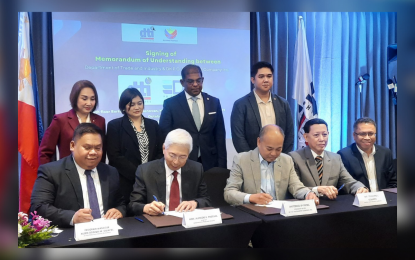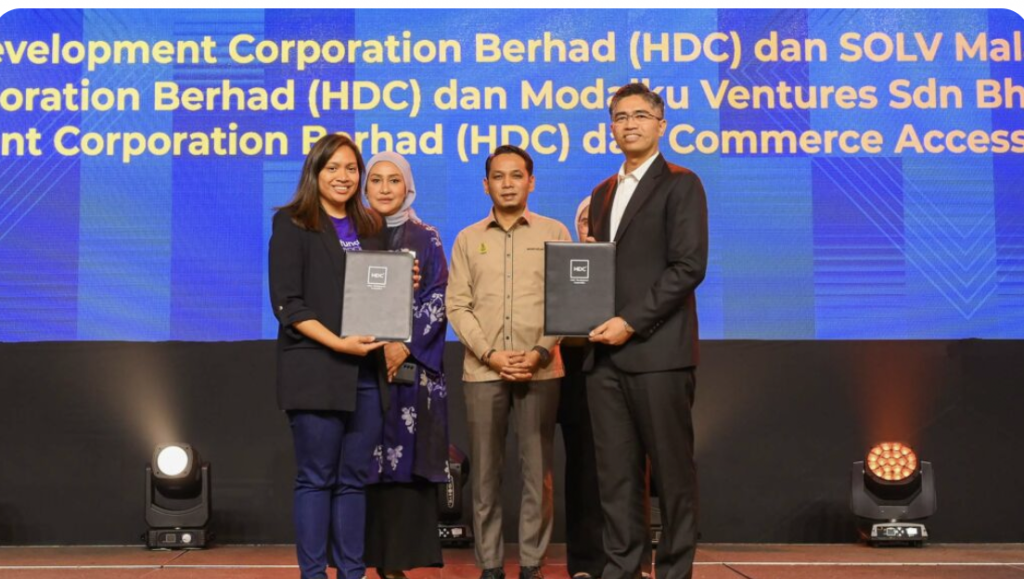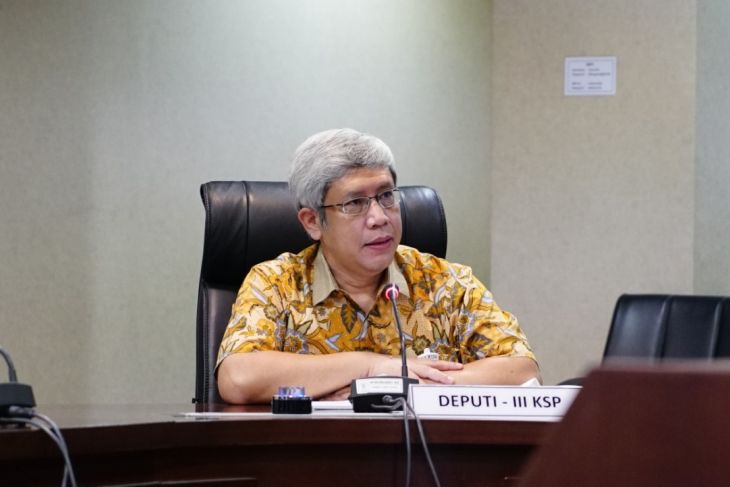 HALAL DEVELOPMENT. Trade Secretary Alfredo Pascual (seated, 2nd from left) sign a memorandum of understanding with DK P.O. Financing Co., Inc. (DKPOFCI) president and CEO Antonio JP Intal (seated, 3rd from left) for a purchase order-based financing that can be tapped by micro, small and medium enterprises (MSMEs) who would like to go halal. Access to non-interest-based financing is part of DTI’s initiatives to grow the local halal industry. (PNA photo by Kris Crismundo)
HALAL DEVELOPMENT. Trade Secretary Alfredo Pascual (seated, 2nd from left) sign a memorandum of understanding with DK P.O. Financing Co., Inc. (DKPOFCI) president and CEO Antonio JP Intal (seated, 3rd from left) for a purchase order-based financing that can be tapped by micro, small and medium enterprises (MSMEs) who would like to go halal. Access to non-interest-based financing is part of DTI’s initiatives to grow the local halal industry. (PNA photo by Kris Crismundo)
MANILA – The Department of Trade and Industry (DTI) wants micro, small and medium enterprises (MSMEs) to tap the huge halal industry by facilitating access to halal certification and Islamic financing.
At the launching of the Halal Economy Festival and Investment Philippines Week in Parañaque City on Monday, DTI Secretary Alfredo Pascual said among the immediate initiatives of the agency in developing the halal industry is encouraging MSMEs to certify their products and services as halal to cater to the growing global Muslim population of 1.9 billion.
“Our intention is to establish a number of these certifying bodies in partnership with those that are already doing it like in Malaysia and other countries. We can adopt their practices, and the standards will follow. (That’s) one of the first orders: to establish the certifying body,” Pascual said during the press conference.
According to United Arab Emirates-based halal-certifying body Prime Group chief executive officer, Mary Jane Alvero-Al Mahdi, there are currently nine local halal-certifying bodies in the country.
These include Islamic Da’wah Council of the Philippines; Halal Development Institute of the Philippines; Mindanao Halal Authority; Muslim Mindanao Halal Certification Board; Halal International Chamber of Commerce and Industries in the Philippines; Islamic Advocate on Halal and Development; Philippine Ulama Congress Organization Inc.; Alliance for Halal Integrity in the Philippines; and Prime Certification and Inspection Asia Pacific.
The Prime Group is also the lone certifying body that is recognized in the Middle East, Alvero-Al Mahdi said at the sidelines of the event.
“Having a halal seal is a value addition in the market niche. There are countries that require them, most are situated in the East Asia and the Pacific and the MENA (Middle East and North Africa) region,” DTI Task Force Halal Industry Development Aleem Siddiqui Guiapal told the Philippine News Agency.
Malaysian Ambassador to the Philippines Dato Abdul Malik Castelino has affirmed Malaysia’s interest in helping the Philippine government to develop its halal industry.
“Malaysia also hopes to work with DTI and the relevant stakeholders in the Philippines on the development of the Halal Industry Masterplan which will add value to the existing Philippines development plans in line with the halal development initiatives up to 2030,” Castelino said.
Earlier, the DTI chief said that under its strategic plan over the next five years, the agency targets to attract PHP230 billion in halal trade and investments that will generate 120,000 jobs.
“The DTI is mandated to develop and promote the halal industry to position the Philippines as the most halal-friendly trade and investment hub in the Asia Pacific region,” Pascual said.
Financing
Pascual also signed a memorandum of understanding (MOU) with DK P.O. Financing Co., Inc. (DKPOFCI) president and CEO Antonio JP Intal to facilitate purchase order-based financing, and not an interest-based financing that is considered “haram,” or forbidden by Islamic Law.
Intal said their business model is like Islamic funding, wherein the company do not earn on interests on loans but only share on the profit of the enterprises, or what DKPOFCI called “excess opportunity sharing program”.
Currently, the MOU’s scope include financing for MSMEs in logistics management, quality control and inspection, custom brokerage, insurances and global sourcing and procurement. (PNA)



